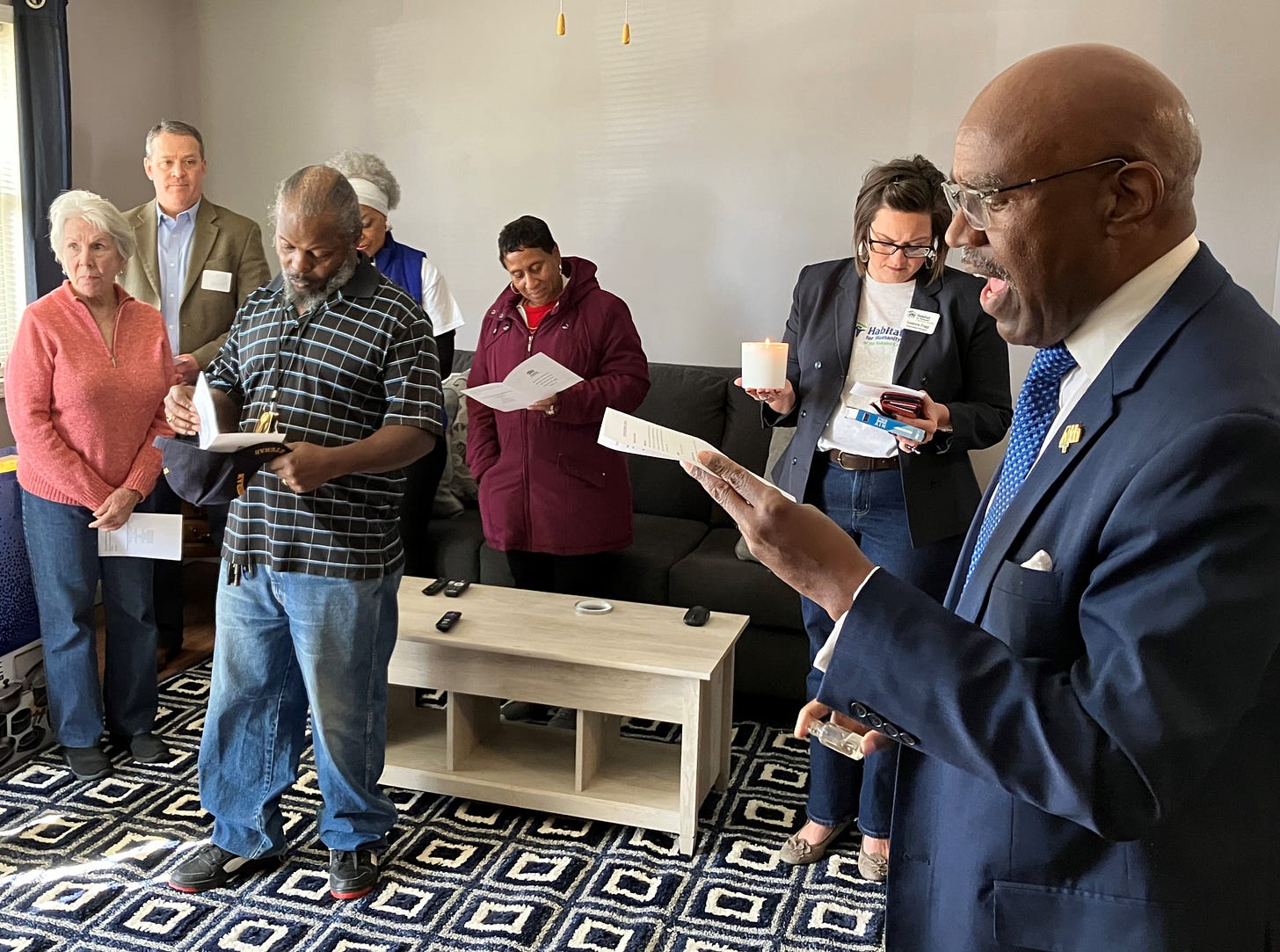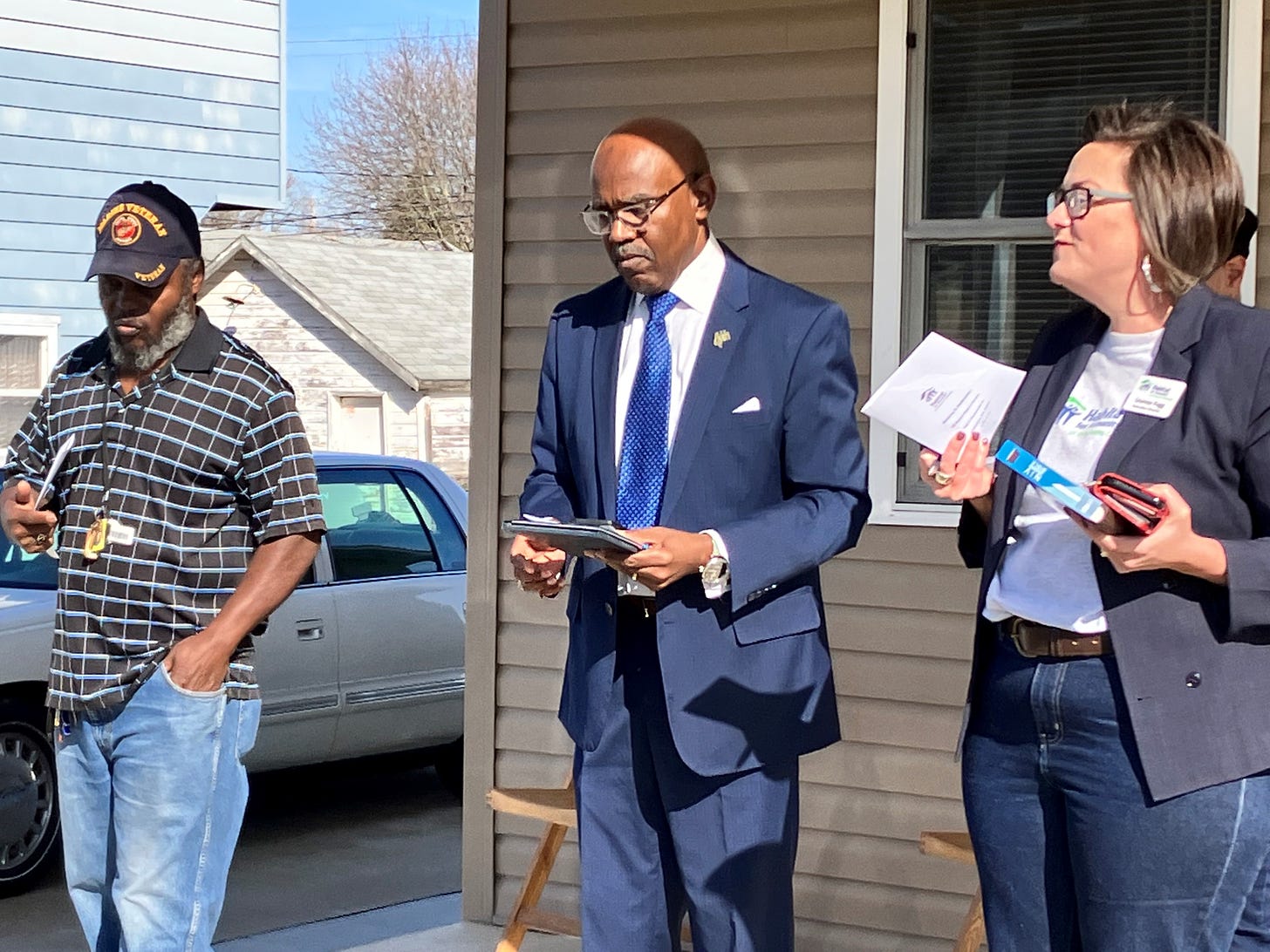Kokomo gave Kevin Dyer a safe place to raise his family. He moved to the area after leaving the U.S. Marine Corps, but hard times followed. Unfortunately, he lost his home to foreclosure during the Great Recession.
Eventually, Dyer became homeless. He has lived at Jackson Street Commons, Kokomo’s shelter for veterans, since 2014. Owning a home again seemed like an unreachable goal. Then he connected with Habitat for Humanity.

Dyer got involved with organization five years ago. In that time, he helped build five homes as he waited his turn to receive his own. That day arrived on Feb. 26.
“It felt great,” said Dyer of the moment he learned his house was going to be built. He and the many volunteers from Habitat for Humanity spent about a year on the project, which culminated with a dedication ceremony on Sunday.
A large group of friends, supporters, and even Kokomo Mayor Tyler Moore were on-hand to mark the dedication of Dyer’s new home. Pastor Gary Williams of Wayman Chapel African Methodist Episcopal Church gave the opening prayer and benediction and anointed each room to bless the home as those in attendance participated in the litany of dedication.
After more than 1,000 hours of “sweat equity” work invested in other houses through Habitat for Humanity, Dyer signed the paperwork for his new home on Feb. 21.
Habitat for Humanity requires home recipients to put in volunteer hours constructing homes in order to qualify for their own. Typically, that means 250 hours of work. Dyer went well beyond what was expected. And he learned along the way. Building a house wasn’t a completely alien task to Dyer, but he credited Habitat for Humanity with teaching him construction skills.
“I had job corps experience in building maintenance where I did carpentry, electric work, stuff like that,” said Dyer. “But I didn’t learn nothing there. I learned how to do all that here.”
The education won’t go to waste. Even though Dyer’s home is built and in his possession, he doesn’t intend on leaving Habitat for Humanity. He said he will continue volunteering as a builder so that others can know the joy of owning a home.
Dyer’s success story is what it is all about, according to Habitat for Humanity Kokomo executive director Leanne Fogg. The organization has been active in Kokomo since 1988. Dyer’s home was the 66th built by the organization in the local community. She explained how the selection process works.

“If you want to be a partner family, we only build about one house a year, so we have one selection process,” said Fogg. “The next selection will be in the fall, depending on how fast our current build goes up. It starts with an informational meeting that we’ll post on our website and social media pages.
“Basically, that is the first step. You receive all the information about Habitat and how it works, what is required, how many people can be in the household, minimum income levels, all of that. If the person or family wants to move forward, that is when they fill out the application.”
Once the family is selected and the property is obtained, the hard work of building the home begins. While the recipient is expected to assist in the construction, Habitat needs a lot more help to complete the project. Volunteers assemble each Saturday throughout the year to build the home, and special build days are organized during the week for organizations and churches that want to use the project as a team-building exercise or community mission.
“If an organization wants to help, we have partner builds,” said Fogg. “They can call the Habitat office at 765-452-2185 and schedule their time to help. A partner build usually takes place during the week as our normal builds take place on Saturdays.
“We have organizations that bring a whole team to the build. We had more than 40 people from Functional Devices come in and do a two-day build. Sometimes, it is smaller teams doing a half-day build. It just depends on what they can offer. We’ll work something out. We never turn down help.”
In the case of Dyer’s home, a long line of volunteer organizations stepped up to help him realize his dream. That included the Western High School National Honor Society, Culver Academy, the Kokomo Police Department, New Beginnings Fellowship Church, NIPSCO, Bayer, State Farm, the Indiana Department of Revenue, Functional Devices, the City of Kokomo, and the family and friends of Terri Mills.
Other organizations sought to assist but could not assemble a team of volunteer builders. Fogg explained that Habitat for Humanity has opportunities for them, too.
“Another way to get involved is to provide lunches,” said Fogg. “Maybe there are members of a church who want to get involved but can’t attend a build. They can provide lunch for our volunteers who come out to the Saturday builds which are open to the public.
“They could make a meal, or we have had some organizations that have just bought pizza and had it delivered to the build.”
United Auto Workers Local 1166, Bruno’s Pizza, and local resident Sharon Carson did their part through meal donations for the teams helping on Dyer’s home.
Of course, volunteering doesn’t pay for the construction materials. Building a home is expensive, and Habitat for Humanity has an income stream to assist in covering the costs. The builds are supported largely by the zero-interest mortgages from the build recipients. The organization currently has 18 mortgages active locally.
“It’s still not enough,” said Fogg. “Most of the mortgages, with escrow, are $300-$400 a month. It is nice income to have, but we have partnerships and accept donations to make up the difference. And we are looking at some grant options.”
For those who would like to donate to Habitat for Humanity, financially or through volunteer hours, or are interested in becoming a partner family and obtaining a home, visit the organization’s website at www.habitatkokomo.com or find them on Facebook by searching for Habitat Kokomo.



The Reverend’s name is backwards. It’s Pastor William Gary.